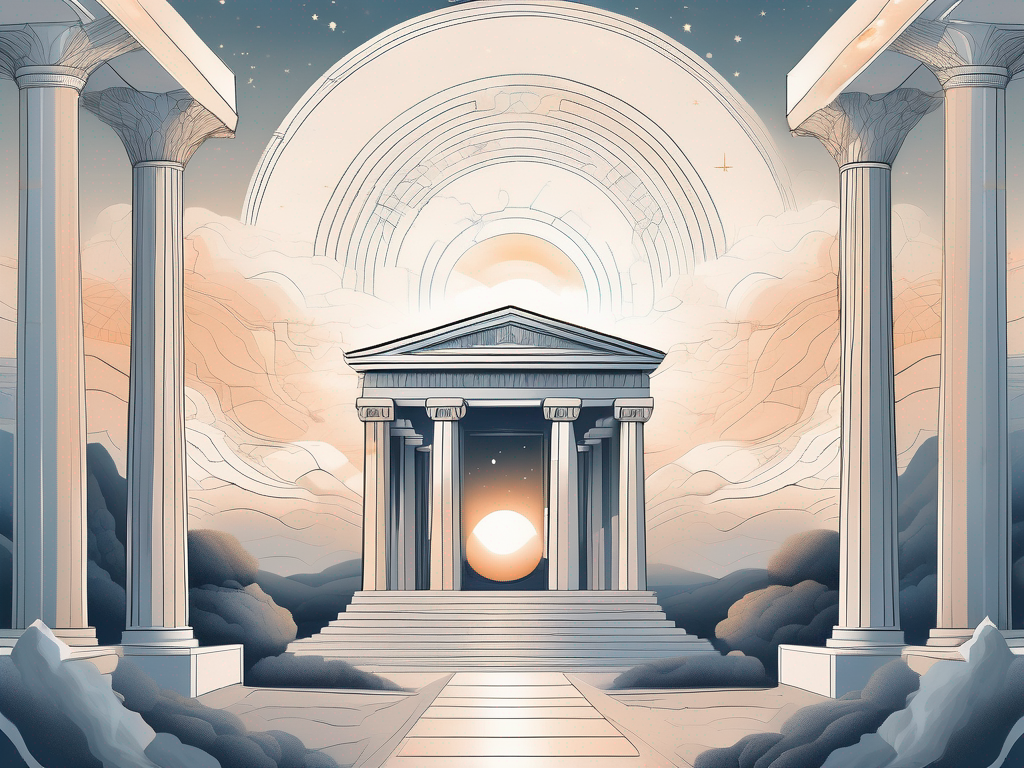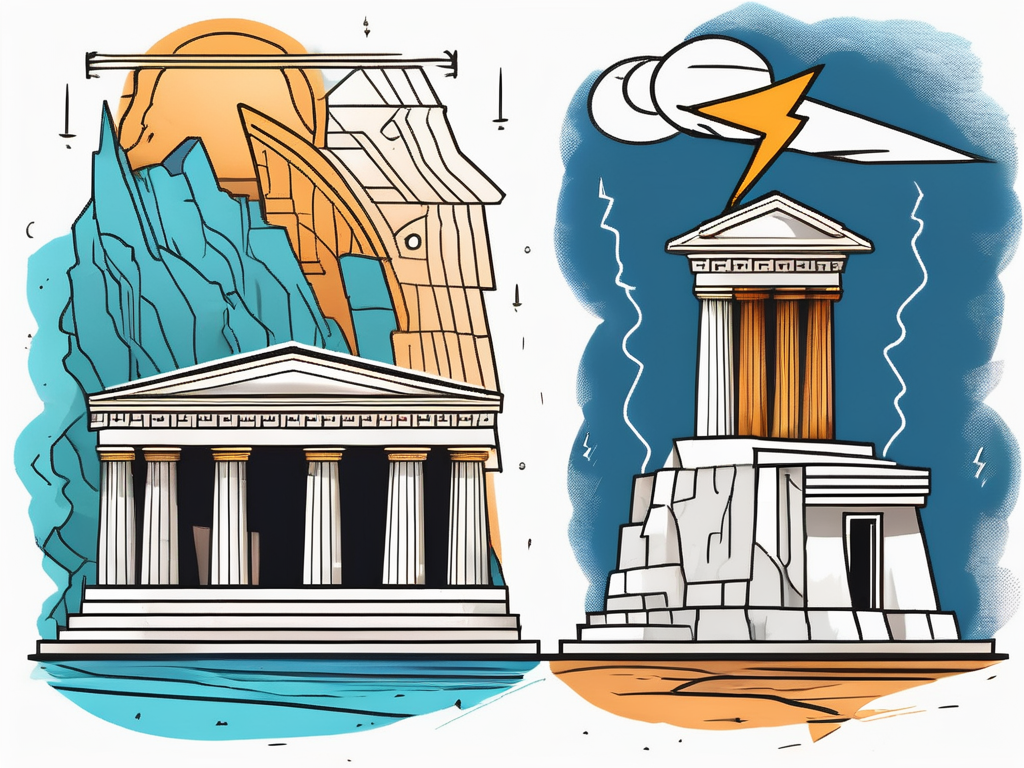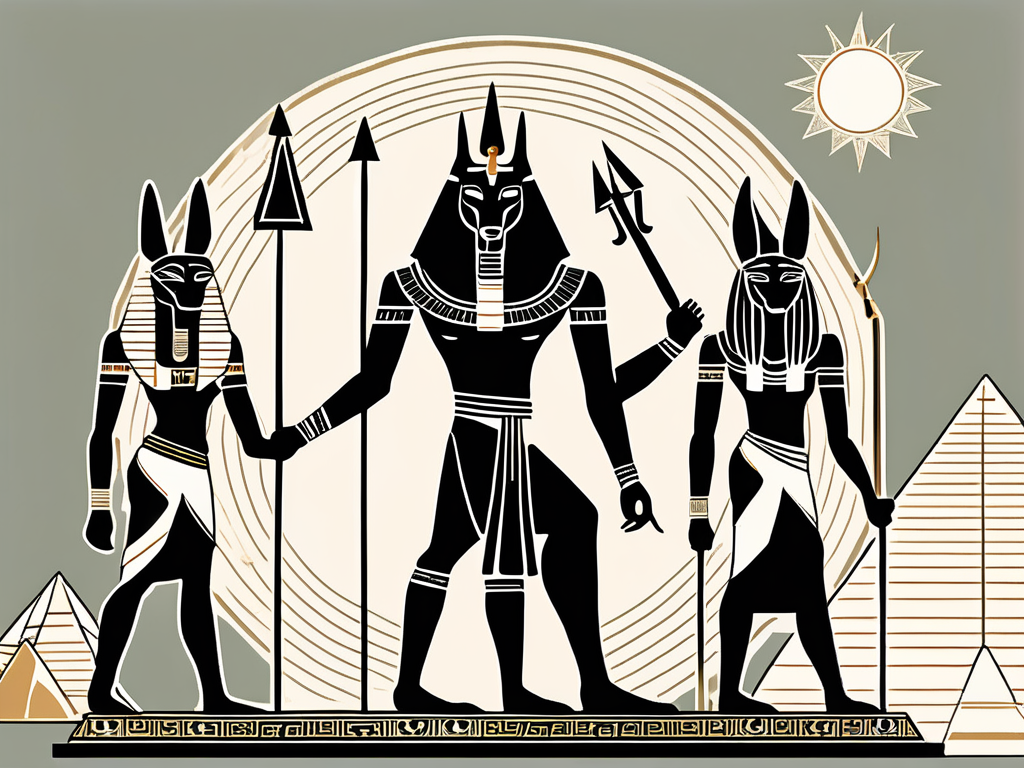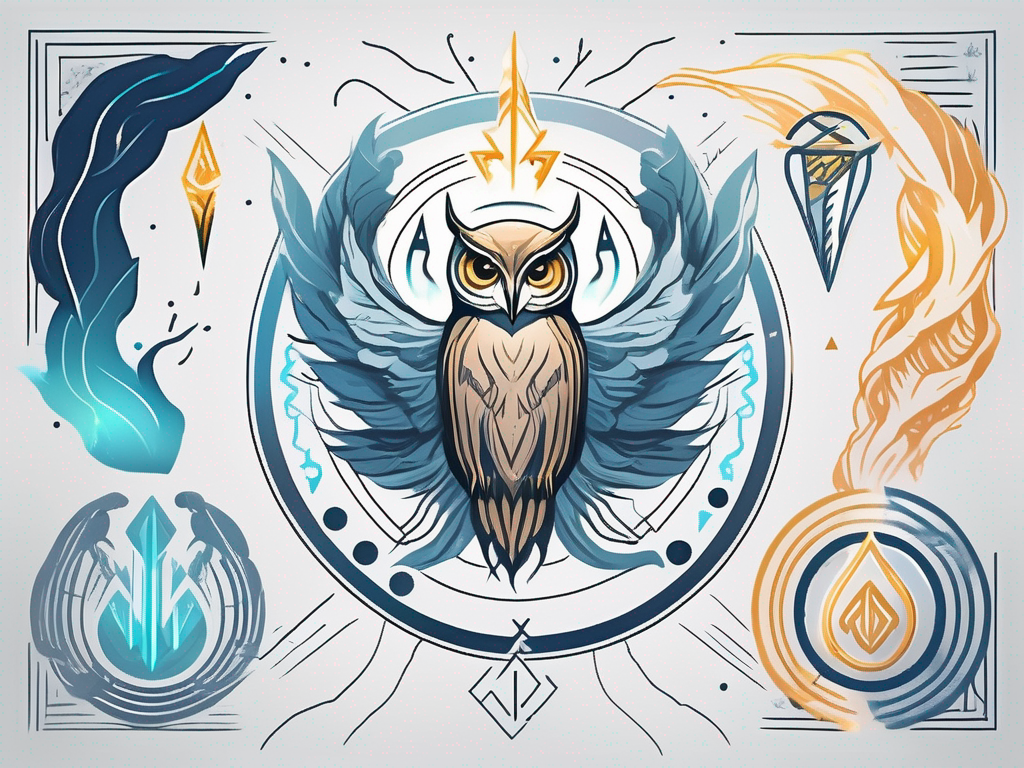The world of Greek mythology is a treasure trove of fascinating gods and goddesses, each with their own unique powers and stories. One such deity that has captivated minds for centuries is Aether. In this article, we will delve into the enigmatic realm of Aether, exploring his concept, symbolism, influence on Greek society, modern interpretations, and theological perspectives. Join us on this journey as we dive into the depths of Aether’s mysteries.
Understanding the Concept of Aether
Before we can grasp the significance of Aether, we must first understand the concept behind this deity. In Greek mythology, Aether represents the personification of the upper atmosphere, symbolizing the purest air and the ether. This celestial being exists beyond the tangible world, serving as a bridge between the mortal realm and the divine. Aether’s essence embodies the universal nature and limitless expanse of the sky.
Aether’s connection to the celestial realm is not merely symbolic but deeply rooted in the fabric of Greek cosmology. In ancient times, the Greeks believed that the universe consisted of concentric spheres, with Earth at the center. These spheres, known as the celestial spheres, were believed to be made of aether, a substance that was considered divine and incorruptible. Aether, therefore, represented the very essence of the heavens, the substance that made up the celestial bodies and filled the spaces between them.
The Origin of Aether in Greek Mythology
According to ancient Greek myths, Aether emerged alongside his sister, Hemera (the personification of day), from the union of Nyx (night) and Erebus (darkness). Aether’s birth represents the emergence of light and the luminous realm that lies above the Earth. His creation formed an intrinsic part of the natural order, casting an ethereal glow over the world below.
As the embodiment of the upper atmosphere, Aether’s presence is felt in the gentle caress of the wind and the soft glow of the stars. He is the force that brings light to the darkness, illuminating the night sky with his celestial radiance. Aether’s ethereal nature is reflected in the delicate dance of the clouds, as they float gracefully across the heavens, painting ever-changing pictures against the backdrop of his divine realm.
Aether’s Role and Significance
Aether holds a significant role in Greek mythology, often depicted as the substance that gods breathe. It is through the breath of Aether that immortality is sustained, and divine powers are heightened. As the god of the upper air, Aether connects the heavens with the Earth, serving as a conduit between the mortal and immortal realms. His influence extends beyond the boundaries of the physical world, guiding the actions and fate of gods and mortals alike.
In the realm of the gods, Aether’s presence is revered and sought after. His ethereal essence is believed to enhance the powers of the divine, granting them the ability to transcend the limitations of the mortal realm. It is said that the gods draw strength from Aether, inhaling his essence to replenish their divine energy and maintain their eternal existence.
For mortals, Aether’s influence is no less profound. The air we breathe, infused with the essence of Aether, sustains our very lives. It is through the invisible currents of his domain that life-giving oxygen is carried to every corner of the Earth, enabling the existence of all living beings. Aether’s presence can be felt in the gentle breeze that rustles the leaves, in the invigorating scent of the sea, and in the crispness of the mountain air.
Furthermore, Aether’s role as a bridge between the mortal and immortal realms gives him a unique position in the Greek pantheon. He is the intermediary between gods and humans, the conduit through which prayers and offerings are carried to the divine. Mortals seek his favor and protection, hoping to catch a glimpse of the divine through the veil of his ethereal realm.
As we delve deeper into the concept of Aether, we begin to unravel the intricate tapestry of Greek mythology. His significance extends far beyond his role as the personification of the upper atmosphere. Aether represents the very essence of the heavens, the substance that connects the mortal and immortal realms, and the force that sustains life itself. Through his ethereal nature, Aether invites us to contemplate the boundless expanse of the sky and the mysteries that lie beyond our reach.
The Symbolism of Aether
As the personification of the sky, Aether carries immense symbolism within Greek mythology. His ethereal nature embodies the qualities of purity, cleanliness, and clarity. The concept of Aether transcends the limits of the Earthly realm, representing the vast and infinite expanse of the heavens. The celestial purity associated with Aether influences both the mortal and divine realms, serving as a guiding force in the lives of those who believe in his power.
Aether as the Personification of the Sky
Aether’s primary symbolism lies in his connection to the sky itself. He represents the brilliance of the upper atmosphere, the glowing dome that envelops the Earth. The sky, with its ever-changing colors, shapes, and patterns, reflects the omnipresence of Aether, reminding mortals of the god’s constant watch over them. Aether’s ethereal reign extends to the celestial bodies that adorn the night sky, reminding us of the natural wonders that exist beyond our reach.
When gazing up at the sky, one cannot help but feel a sense of awe and wonder. The vastness and beauty of the heavens inspire a multitude of emotions, from tranquility to curiosity. Aether’s symbolism as the personification of the sky captures these sentiments, inviting mortals to contemplate the mysteries of the universe. In his celestial domain, Aether reigns supreme, casting his ethereal light upon the Earth and its inhabitants.
Throughout history, various cultures have assigned different meanings to the sky. In Greek mythology, Aether embodies the purest essence of the heavens. His presence is felt in the gentle breeze that caresses the skin, in the warmth of the sun’s rays, and in the twinkling of the stars at night. Aether’s symbolism as the personification of the sky reminds us of the interconnectedness of all things, as the sky unites the Earth with the celestial realm.
Aether in Relation to Other Greek Gods
Aether’s presence extends beyond his celestial dominion. He maintains a close relationship with several other Greek gods, especially those associated with the sky and the heavens. One such deity is Zeus, the king of the gods, who resides atop Mount Olympus and controls the forces of nature. As the god of lightning and thunder, Zeus’s connection to Aether aligns them in a harmonious alliance, symbolizing their shared domain and influence over the mortal realm.
Together, Aether and Zeus oversee the celestial phenomena that shape the Earth’s climate and weather patterns. Their collaboration ensures the balance and order of the natural world, as Aether’s ethereal presence harmonizes with Zeus’s powerful thunderbolts. The union of these two deities represents the intricate relationship between the sky and the forces of nature, highlighting the interconnectedness of all elements in the cosmos.
Another god closely associated with Aether is Helios, the personification of the Sun. As the radiant source of light and warmth, Helios illuminates the Earth, bringing life and vitality to all living beings. Aether’s symbolism as the personification of the sky complements Helios’s role as the Sun god, as they work in tandem to create the perfect conditions for growth and prosperity. The celestial dance between Aether and Helios showcases the divine collaboration that sustains life on Earth.
Furthermore, Aether’s influence extends to the goddess of love and beauty, Aphrodite. As the goddess born from the sea foam, Aphrodite embodies grace, elegance, and desire. Aether’s ethereal nature aligns with Aphrodite’s enchanting allure, as both entities evoke a sense of purity and transcendence. Together, they inspire mortals to seek beauty in all aspects of life, reminding them of the divine essence that resides within each individual.
In conclusion, Aether’s symbolism as the personification of the sky encompasses a multitude of meanings and associations. From his ethereal reign over the heavens to his harmonious alliances with other Greek gods, Aether’s presence permeates every aspect of the mortal and divine realms. As mortals, we are invited to contemplate the vastness and beauty of the sky, to marvel at the celestial wonders that lie beyond our reach. In Aether’s celestial dominion, we find solace, inspiration, and a reminder of our connection to the divine.
Aether’s Influence on Greek Culture and Society
Aether’s impact extends beyond the realm of mythology, permeating various aspects of Greek culture and society. From literature to art and even architecture, Aether’s presence can be felt in the achievements of ancient Greece.
Aether’s Impact on Ancient Greek Literature
Within the pages of ancient Greek literature, Aether is frequently mentioned and revered. Poets and playwrights often invoked his name and sought inspiration from his ethereal essence. Aether’s inclusion in literary works added depth and a touch of otherworldly beauty to the storytelling, reminding readers of the connection between the physical and metaphysical realms.
Aether’s Presence in Greek Art and Architecture
Aether’s influence is seen not only in words but also in the visual arts. In ancient Greek art, depictions of Aether were common, often portrayed as a serene figure surrounded by celestial elements. His presence in sculptures and paintings added a touch of divine transcendence to public spaces, reinforcing the power and significance of the heavens in Greek culture.
Modern Interpretations of Aether
As time has passed, Aether’s image has evolved alongside changing beliefs and societal norms. Modern interpretations of Aether explore fresh perspectives and delve into innovative realms, often found in contemporary media and popular culture.
Aether’s Presence in Contemporary Media
In today’s media landscape, Aether continues to inspire and captivate audiences. His portrayal in movies, books, and even video games mirrors the fascination with mythology that persists in our modern world. Contemporary interpretations of Aether offer a bridge between the past and the present, inviting individuals to explore ancient legends in new and exciting ways.
The Evolution of Aether’s Image Over Time
As society evolves, so too does our perception of Aether. The god of the upper air finds new life in modern artwork and illustrations, often being reimagined with a contemporary twist. Artists explore Aether’s essence through different visual styles, capturing his ethereal nature and the profound impact he has on the human imagination.
Theological Perspectives on Aether
Aether’s divine nature extends beyond Greek mythology, finding his place within various theological perspectives throughout history. The exploration of Aether’s connection to other deities and the role he plays in modern paganism sheds light on the continued significance of his presence.
Comparisons Between Aether and Other Deities
When examining Aether in a theological context, several parallels can be drawn between him and other gods across different belief systems. Comparisons with deities such as Odin from Norse mythology and Varuna from Hinduism highlight the universal perception of an all-encompassing celestial force, connecting cultures and civilizations through the shared concept of the ethereal.
The Role of Aether in Modern Paganism
In modern pagan practices, Aether often assumes a prominent role. Pagans perceive Aether as a potent elemental force, representing the quintessence that permeates all things. Aether’s inclusion in rituals and ceremonies serves as a reminder of the interconnectedness of the physical and spiritual planes, fostering a deeper understanding of our place within the universe.
In conclusion, the mysteries surrounding Aether, the Greek god of the upper air, continue to captivate minds across the ages. From ancient mythology to modern interpretations, Aether’s ethereal essence bridges the gap between mortal and immortal realms, leaving an indelible mark on the tapestry of Greek culture and society. Whether seen as a symbol of purity or as part of contemporary media, Aether’s enigmatic power endures, reminding us of the ethereal beauty that lies beyond our reach.












